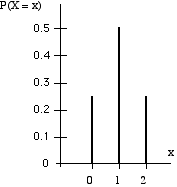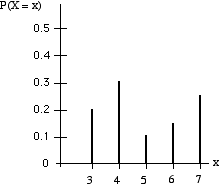1. a.
|
x
|
0
|
1
|
2
|
|
P(X = x)
|
0.25
|
0.5
|
0.25
|
b.

2. The discrete random variable X has a probability distribution as follows:
|
x
|
3
|
4
|
5
|
6
|
7
|
|
P(X = x)
|
0.2
|
0.3
|
z
|
0.15
|
0.25
|
a. z = 0.1
b. P(4 ≤ X ≤ 6) = 0.55
c. P(X < 5) = 0.5
d.
3.
a. Let X = number of heads
|
x
|
0
|
1
|
2
|
3
|
|
P(X = x)
|
1 / 8
|
3 / 8
|
3 / 8
|
1 / 8 |
b. Let X = total score of two dice
|
x
|
2
|
3
|
4
|
5
|
6
|
7
|
8
|
9
|
10
|
11
|
12
|
|
P(X = x)
|
1 / 36
|
1 / 18
|
3 / 36
|
1 / 9 |
5 / 36
|
1 / 6
|
5 / 36
|
1 / 9
|
3 / 36
|
1 / 18 |
1 / 36
|
c. Let X = difference between numbers on dice
|
x
|
0
|
1
|
2
|
3
|
4
|
5
|
|
P(X = x)
|
1 / 6
|
5 / 18
|
2 / 9
|
1 / 6 |
1 / 9
|
1 / 18
|
4. k = 0.1
5.a. The probability of 1.1 has to be wrong as the highest probability possible is 1.
b. The correct value is 0.1 (The probabilities then add up to 1.)
6.
|
x
|
0
|
1
|
4
|
|
P(X = x)
|
0.2
|
0.4
|
0.4
|
7.
|
x
|
0
|
1
|
2
|
3
|
4
|
|
P(X = x)
|
81 / 625
|
216 / 625
|
216 / 625
|
96 / 625 |
16 / 625 |
8. k = 1 / 15
